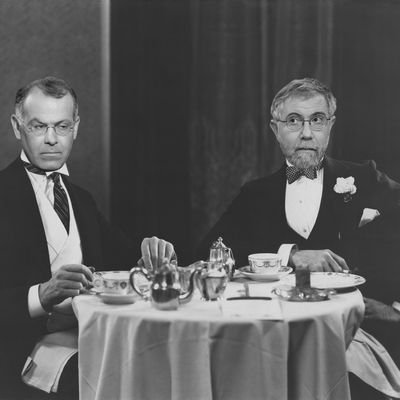
New York Times columnists are not supposed to argue with each other in the op-ed pages. But sometimes Times columnists argue with unnamed persons who have the exact same views as other New York Times columnists, and quite often, those people are named “Paul Krugman” and “David Brooks.”
Today Krugman corrects conservatives who define income inequality as something splitting the richest 5 percent from everybody else:
… the main thing about this myth is that it misidentifies the winners from growing inequality. White-collar professionals, even if married to each other, are only doing O.K. The big winners are a much smaller group …
how can the myth of the deserving rich be sustained? Mainly through a strategy of distortion by dilution. You almost never see apologists for inequality willing to talk about the 1 percent, let alone the really big winners. Instead, they talk about the top 20 percent, or at best the top 5 percent.
The column builds off a previous Krugman blog item, which calls out “the urge to sociologize“:
What’s a sociologizer to do? Well, what you see, over and over, is that they find ways to avoid talking about the one percent. They talk about the top quintile, or at most the top 5 percent; this lets them discuss rising incomes at the top as if we were talking about two married lawyers or doctors, not the CEOs and private equity managers who are actually driving the numbers. And this in turn lets them keep the focus on comfortable topics like family structure, and away from uncomfortable topics like runaway finance and the corruption of our politics by great wealth.
Hey — you know who just wrote a column playing down the importance of inequality and defining it as a split between the top 5 percent and everybody else? David Brooks! Just three days ago:
At the top end, there is the growing wealth of the top 5 percent of workers. This is linked to things like perverse compensation schemes on Wall Street, assortative mating (highly educated people are more likely to marry each other and pass down their advantages to their children) and the superstar effect (in an Internet economy, a few superstars in each industry can reap global gains while the average performers cannot).
Brooks also loves sociological analysis and has called his style “comic sociology.”
If only Krugman and Brooks knew about this direct disagreement of theirs, they could have some kind of debate.






























